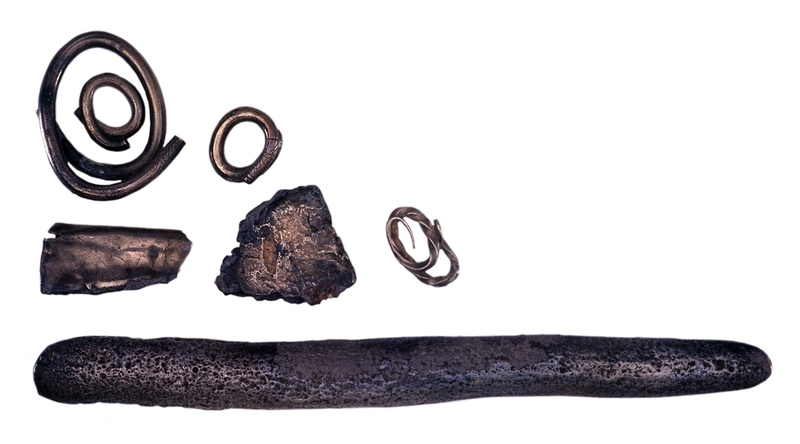Egyptian Ingots and Metal Rings
Dublin Core
Title
Egyptian Ingots and Metal Rings
Subject
Early Egyptian Coinage
Description
From el-Amarna, Egypt
18th Dynasty, 14th century BC
Egypt's earliest money
These ingots and metal rings date from the fourteenth century BC and were found at el-Amarna. They give us rare archaeological evidence for Egypt's earliest money system.
Before coins started to circulate in ancient Egypt around 500 BC, there was a system of values based on weights of gold, silver and copper. Metal measured in units of weight known as deben (around 90 g) could be used to settle bills and to trade. Records from the Eighteenth Dynasty (1550-1295 BC) show that often the actual metal did not change hands; instead it was used to value goods for exchange. Egypt had no easily accessible source of silver, but the Egyptian word for silver, hedj, came to mean something close to 'money'.
The complete ingots from el-Amarna weigh around 3 deben (265-286 g) and the rings seem to be fractions of the deben.
J. Williams (ed.), Money: a history (London, The British Museum Press, 1997)
18th Dynasty, 14th century BC
Egypt's earliest money
These ingots and metal rings date from the fourteenth century BC and were found at el-Amarna. They give us rare archaeological evidence for Egypt's earliest money system.
Before coins started to circulate in ancient Egypt around 500 BC, there was a system of values based on weights of gold, silver and copper. Metal measured in units of weight known as deben (around 90 g) could be used to settle bills and to trade. Records from the Eighteenth Dynasty (1550-1295 BC) show that often the actual metal did not change hands; instead it was used to value goods for exchange. Egypt had no easily accessible source of silver, but the Egyptian word for silver, hedj, came to mean something close to 'money'.
The complete ingots from el-Amarna weigh around 3 deben (265-286 g) and the rings seem to be fractions of the deben.
J. Williams (ed.), Money: a history (London, The British Museum Press, 1997)
Source
The el-Amarna Hoard
Publisher
The British Museum, M 1974,0223.1
http://www.britishmuseum.org/explore/highlights/highlight_objects/cm/t/the_el-amarna_hoard.aspx
http://www.britishmuseum.org/explore/highlights/highlight_objects/cm/t/the_el-amarna_hoard.aspx
Date
14th c. BCE
Rights
© Trustees of the British Museum
Format
Length: 20.800 cm (largest piece)
Width: 1.950 cm (largest piece)
Thickness: 1.050 cm (largest piece)
Width: 1.950 cm (largest piece)
Thickness: 1.050 cm (largest piece)
Type
Coins and Metal
Collection
Citation
“Egyptian Ingots and Metal Rings,” Hallie Ford Museum of Art Exhibits, accessed February 24, 2026, https://library.willamette.edu/hfma/omeka/items/show/16.
